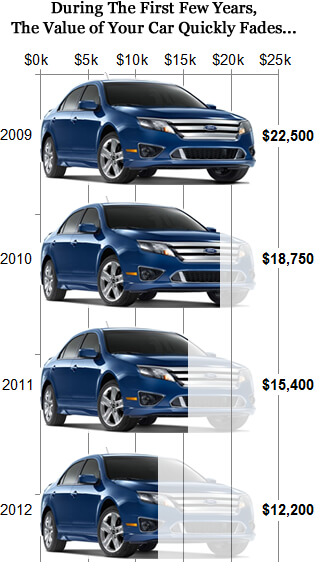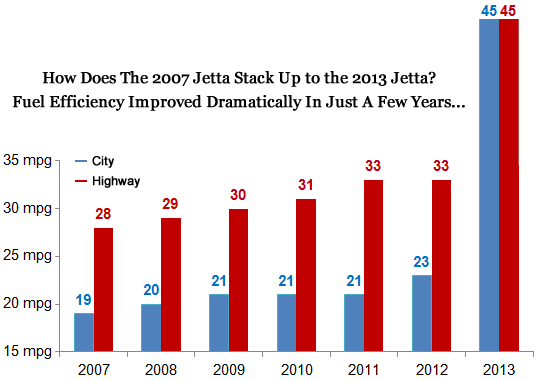Here’s a Tip: Buying a New Car is for Suckers
Just one more year.
That’s the goal as we cajole our cars to stay on the road for a little longer. Yet there invariably comes a time when an aging car is no longer worth the hassle. By the time the odometer hits 150,000 miles, the repair bills start piling up and the annual cost of ownership rises.
#-ad_banner-#For many people, that signals it’s time to buy a new car. But it’s not always the wisest move. Faced with a choice of buying a new car, leasing a new car or buying a used car, it’s the latter two options that make the most sense.
Here’s why…
Dollars flying out of the showrooms
There’s an old cliche — and it’s true — that a new car instantly loses value the minute you drive it out of the showroom. And the value of that car drops quickly, at least in its initial years.
Here’s a look at a 2009 Ford Fusion that cost $22,500 when new and what it was worth three years later.
 As this chart shows, a three-year-old Ford Fusion with 30,000 miles has lost roughly 40% (or $10,000) of its value.
As this chart shows, a three-year-old Ford Fusion with 30,000 miles has lost roughly 40% (or $10,000) of its value.
Think about it. Though the Fusion is being upgraded for the 2013 model year, the 2012 model is very similar to the 2009 model. When you consider that a new 2012 Fusion or a used 2009 version are likely to give you more than 100,000 (mostly) trouble-free miles of service, why would you spend the extra $10,000 for a new one?
Of course, you could argue that the newer version would fetch more money when it comes time to sell it. Let’s look at an older Ford sedan — the Taurus. If you bought a new 2007 Ford Taurus and put 70,000 miles on it, then it’s now worth about $5,500, according to KBB.com. But if you bought a used 2004 Ford Taurus in 2007 with 30,000 miles on it — and you have also driven it 70,000 miles (giving it a total of 100,000 miles on it now) — then it’s now worth $4,500. From the earlier example, we saw that a new Ford sedan lost roughly $10,000 in value during three years. So, in effect, the used Taurus cost $10,000 less to buy, but is worth only $1,000 less today.
Buy or lease?
Even if you insist on driving off in a new car, buying still isn’t your best option. Auto makers now have access to “cheap money” as interest rates remain near historic lows. So they can pass on to customers those lower financing costs in the form of lower lease rates. For example, Honda had been offering $199-a-month, three-year leases on new Accords (before a recent model redesign), and if its borrowing costs had been higher — in line with historical norms — then those monthly rates likely would have been $30 or $40 more per month.
Of course, an auto loan for the purchase of a new car now carries a fairly low interest rate. If you crunch the numbers, then you’ll likely find the amount you spend on a three-year lease is roughly similar to the amount of deprecation you’ll suffer in the ownership of that car.
There is another, more prosaic reason to avoid buying a new car right now. Automotive engineers are making such remarkable progress on so many fronts — from fuel efficiency to safety to infotainment — that each successive model year seems to bring a vastly improved car.
If you lease a car for three years, then you will be able to upgrade to the newer, more efficient and dynamic models that auto makers will be selling in a few years from now. But if you buy a new car now, then you’re likely to feel compelled to hang on to it a lot longer than three years. If you hold on to that car for seven or eight years, as many Americans do, then you’ll soon have a case of car envy as your neighbors drive newer cars with features and performance that we didn’t even dream of previously.
Let’s use fuel efficiency as an example. The chart below shows miles per gallon when the Volkswagen Jetta is driven in the city and on the highway.

Those steady gains are fairly impressive. Yet for the 2013 model year, VW is selling a hybrid version of the Jetta that gets roughly 45 miles to the gallon in the city and on the highway — all for a starting price under $25,000.
Someone who bought a new 2011 Jetta with plans to keep it for many years might be kicking themselves. Especially when you consider that the 2015 or 2017 Jetta is likely to show even further mileage gains than the 2013 hybrid. That, in a nutshell, is why it’s unwise to buy a new car and own an asset that quickly depreciates in value and also delivers and comparatively worse fuel efficiency with each passing year.
Action to Take –> The only benefit from owning a new car stems from the satisfaction of driving a vehicle that has never been driven before. Yet if you are looking for the most bang for your buck, then buying a lightly used, two- to three-year-old car is the way to go. If you prefer new vehicles, then lease prices are quite competitive with new-car purchases and they don’t lock you into long-term ownership at a time when automotive engineering is advancing at a rapid clip.
This article originally appeared on InvestingAnswers.com:
Why Buying a New Car is For Suckers
